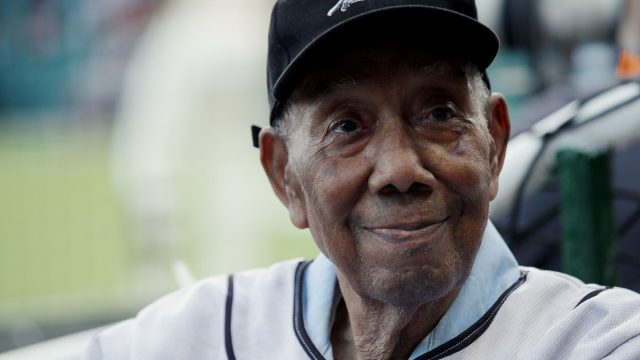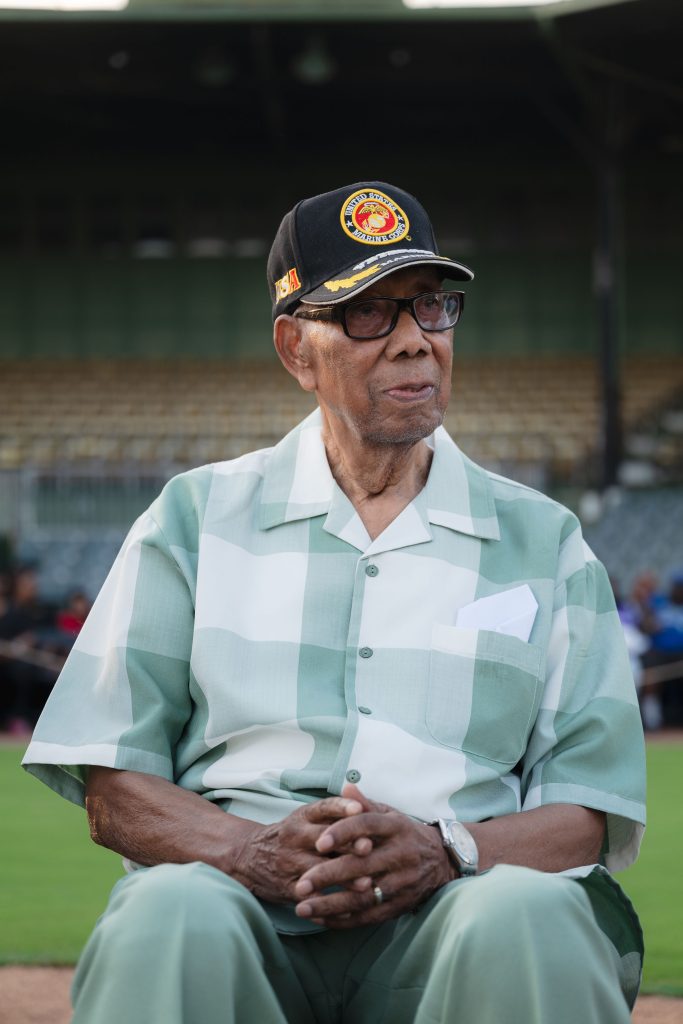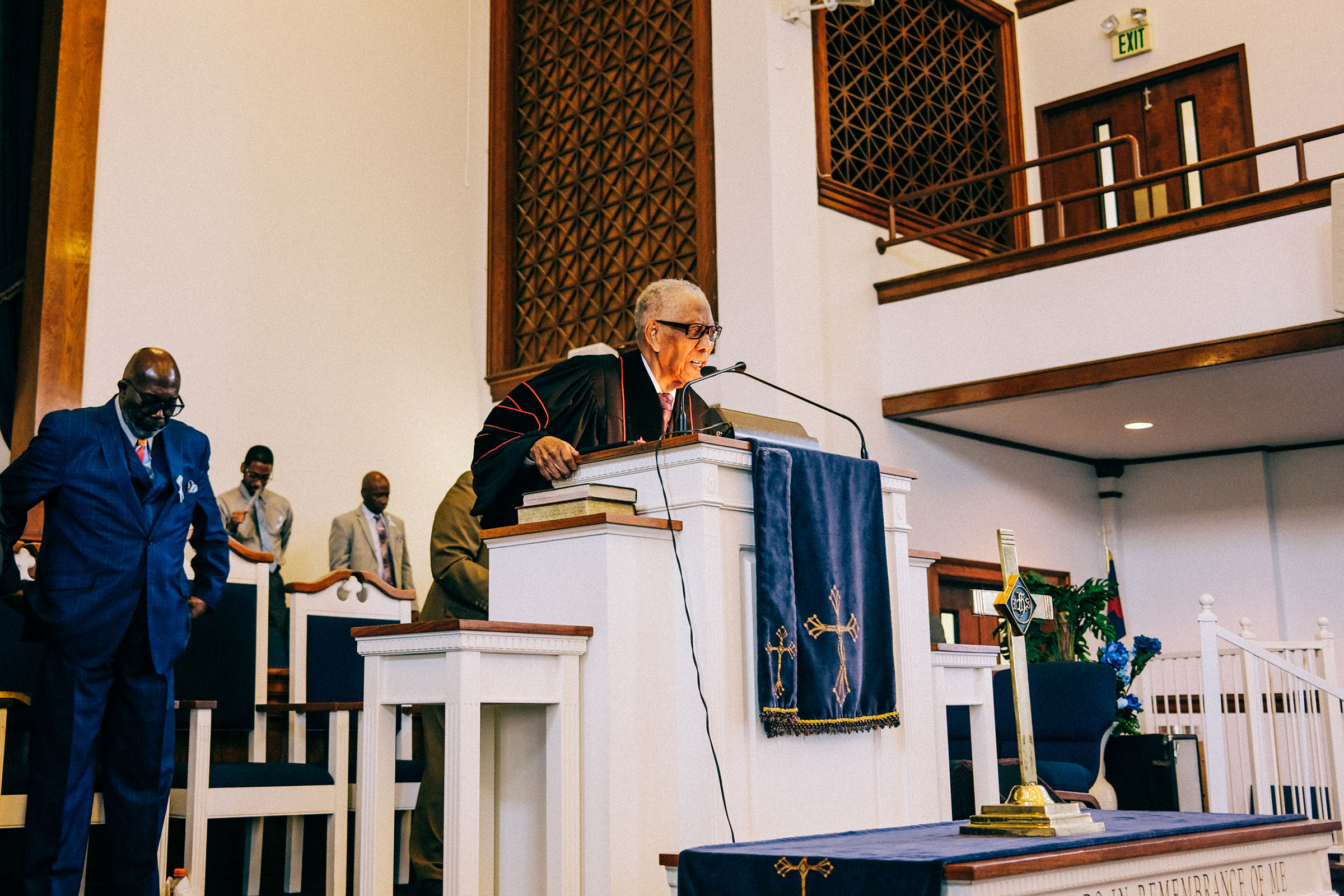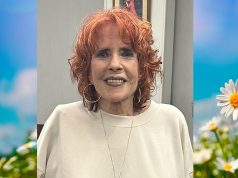
By Matthew Ritchie | mlb.com
The thing that stood out most in Reverend Bill Greason’s introduction in the basement of Bethel Baptist Church in Berney Points in Birmingham, Ala., was a specific piece of information that he was particularly proud to share. Before a recording session of the “Road to Rickwood” Podcast back in February, Greason dutifully shared his name, occupation and where he was from before finally getting to his age — 99 years old and 6 months.
A phrase that sticks in your mind when you hear it, and likely changes your vocal pattern when it comes from the mouth of someone with stories to tell from a life that’s been fully lived.
Last week, Greason celebrated his 100th birthday in Birmingham, with no additional months added. Sure, baseball (and the greater society at-large), has an obsession with round numbers, giving them an inflated sense of importance. But for Greason, the oldest living person to play in the Negro Leagues and a World War II veteran, the milestone of reaching triple digits is something he never imagined. Its importance cannot be overstated.
“I’m just thankful that God allowed me to be here this long,” Greason said. “I’m thankful for life: God’s been good to me, and He is good to me. Allowed me to live the age that I am and to have the activities of my life. It’s surprising to me. I never thought I’d live this long after being in two wars, baseball and traveling. It’s been a blessing.”
For the celebration, Greason’s fellow spiritual leaders, veterans and Negro League legends descended upon Rickwood Field to show love and support to his life. A reignition of a full-circle moment for Greason, who played for the Birmingham Black Barons from 1948-51 and threw out the first pitch at MLB’s Tribute to the Negro Leagues game between the Giants and Cardinals in June. At the game, the baseball world caught just a sliver of Greason’s magnificent life story when he spoke with Ken Rosenthal about his experiences, memories of Rickwood Field and the impact of Willie Mays on baseball and Birmingham.
Born Sept. 3, 1924
Greason found his way to baseball almost by accident, by virtue of youthful curiosity and boundless energy. Born on Sept. 3, 1924, and raised in Atlanta — growing up across the street from the esteemed Dr. Martin Luther King Jr. on Auburn Avenue — Greason played baseball on the sandlot as a kid. Cutting his teeth in pickup games with his friends, he felt almost a natural affinity to pitching. There wasn’t a semblance of coaching or guidance that led him while on the mound, just piecing together information from his own experiences each time he threw a pitch, from the community full of others who could guide the way.
“I was blessed to be around a few guys who played semi-pro baseball,” Greason said. “And when you observe a thing long enough, you can learn to do what others do. That’s the way it was [with] me.
“As you grow, your arm becomes stronger. And that way, you’re able to do something with it: Not just throw hard, but to make the ball do something. I was able to make the ball do something.”

U.S. Marine Corps
Even though Greason armed himself with a special curveball in his youth (which would become his signature during his playing career), any prospects of professional sports were delayed from the outset with the outbreak of WWII. He entered the U.S. Marine Corps in 1943, becoming a part of the segregated, all-Black unit that was stationed at Camp Lejeune in North Carolina.
Greason was deployed to the Pacific Theater at the tail end of the war, landing at Iwo Jima during the U.S. invasion in 1945. The crushing horrors and all-encompassing violence he witnessed became part of the reason that he moved closer to God: he saw his two best friends killed in front of him on the island, and he turned back to spirituality in faith and desperation.
“I was called by God, I made a vow on Iwo Jima,” Greason said. “But I promised. I promised him that if He saved me, whatever He wanted me to do, I would do. So I didn’t know I escaped his calling for a long time; but then one day He said, ‘It’s time.’ So I put everything aside, concentrated on being what He wanted me to be.”
But Greason’s winding journey returned back to baseball before it arrived at the pulpit. After being discharged from the Marines, he returned stateside and ended up pitching for the Nashville Black Vols in 1947. The following year, he captured the attention of catcher Pepper Bassett and manager Piper Davis of the Birmingham Black Barons and was acquired for the 1948 season — the last great iteration of Black Birmingham’s pride and joy.
Birmingham Black Barons
Greason was integral part of the Black Barons’ pitching staff, helping a squad rife with future Major League talents and Negro Leagues icons (a 17-year old Mays, Davis and Artie Wilson, to name a few), scratch and claw its way to the last Negro Leagues World Series. The Barons ran up against the Kansas City Monarchs in the Negro American League Championship Series, pushing the set to a deciding Game 7. Davis, the player/manager in that season, looked around his clubhouse and saw depleted arms all around him, with only one player left to turn to.
“Well, I pitched the game that put us in the last Negro League World Series,” Greason said. “In Kansas City, the others were pitched out, I guess. And so, Piper gave me the ball, and that night, I took care of some business. … I did what I did.
“I got two strikes on you, I would go, ‘Bye.’”
Greason was part of the slew of Negro Leaguers who proliferated into the Major Leagues following Jackie Robinson’s debut with the Brooklyn Dodgers in 1947. He was acquired by the Cardinals in 1953 and made his National League debut the following season — appearing in three games for St. Louis on the mound.
But the promise of progress and the shine of integration wore off almost immediately upon Greason’s arrival. He faced the harrowing impact of Jim Crow in the Minor Leagues while playing for Oklahoma City, and then silent violence of segregation during his brief stint in the Majors. Greason didn’t feel any kinship with his teammates, who were scared to interact with him off the field in fear of being labeled as a racial sympathizer.
It would have been understandable for Greason to lash out, to forsake the sport and society that rejected him based on his skin color. But that wasn’t — and isn’t — Greason’s style. He continued to put one foot in front of the other, playing baseball professionally in Puerto Rico and in the Minors until his retirement in 1959.
“It helps to know who you are,” Greason said. “I realized I am God’s child, and I’m representing a whole people. I just wanted to be an example for others to follow.”
After his retirement, Greason returned home to his wife’s hometown, Birmingham, where he’s remained since the early 1960s. In the throes of the civil rights fight for equal rights for Black folks — he was a parishioner at 16th Street Baptist Church that was bombed by the Ku Klux Klan on Sept. 15, 1963, that killed Addie Mae Collins, Carol Denise McNair, Cynthia Wesley and Carole Rosamond Robertson — Greason felt the call to the ministry.

Trusting God
The promise that Greason made on Iwo Jima rang around in his head, as well as the guidance from his parents, who raised him in a Christian household. At some point, the pull towards the church became too great to ignore.
“My mom and dad, my mom especially, were Christians,” Greason said. “Once you become a Christian, you depend on God – trust God – to help you to be whatever He wants you to be. That’s been my life, it hasn’t been about me. When I came off the island, Iwo Jima, I was ready to give him everything that I have with it. Because that was a blessing.”
Greason became the pastor at Bethel Baptist Church in 1971, where he’s remained to this day.
These days, it takes a lot for Greason to bring his mind (and attention) back to baseball. The basement of Bethel is a mini-museum to Greason’s accomplishments as a player and a veteran, but back in February, he admitted that he rarely goes down there — that those events were part of his past, not his present.
But as Greason crosses the 100-year threshold, there’s an unshakeable pride in the Negro Leagues and those Black baseball legends who played despite knowing they’d never get the full recognition they deserved. When he speaks of being able to see other former Negro Leaguers at Rickwood Field back in June, the bittersweet recollection hits hard, acknowledging the happiness from seeing others with him, while remembering those who passed away years before.
“There’s just a few of us left, my last person I talked about was Willie,” Greason said. “We were just like brothers, and he got out of here before I did.”
And as someone who has stood at the pulpit for more than 50 years, spreading the gospel of his faith, Greason has no qualms about reminding people of the greatness and contributions of Black players of old. He keeps the spirit and memory of those Negro Leaguers that he played with alive, refusing to let their history be erased by apathy or ignorance.
“They’re learning what took place, and how we were able to play in what was going on at the time, and how we didn’t complain and kept it decent,” Greason said. “It was just a blessing for us to be a participant in this great game of baseball. You don’t see many of us in the Majors now, just a few, but we had to be an example for those who would follow us.
“It was a blessing to see us participate in a sport where it was hard for us to be a part of. Jackie did a great job being the first one being chosen, and how he conducted himself. Jackie, Satchel Paige, all those guys. They did a tremendous job in keeping our dignity alive.”
100 YEARS OF SERVICE AND CITIZENSHIP
Throughout 100 years of American life, William Greason has been directly connected to some of the United States’ most consequential and historic people, places, moments and movements.
- Attending Ebenezer Baptist church as a boy with a young Martin Luther King Jr.
- Becoming one of the first Black men to wear a Marine Corps uniform
- Saluting the American flag as it was raised at Iwo Jima, as part of the 66th supply platoon
- Being discovered as a gifted multi-sport athlete
- Becoming a curveball specialist and elite baseball prospect at age 23
- Mentoring a young teenage baseball talent on the Birmingham Black Barons named Willie Mays
- Pitching in the Negro League World Series at Rickwood Field in 1948
- Becoming the first Black pitcher for the St. Louis Cardinals in the Major Leagues
- Enduring the 1963 bombing of his Church – 16th Street Baptist – by the Ku Klux Klan, which killed four young members of his congregation
- Taking the wisdom and wounds from his life’s journey toward a doctoral degree in divinity studies in Birmingham, Alabama
- Serving as pastor at Bethel Baptist Church for 53 years
- Organizing service projects throughout the years for those in need
- Offering passionate sermons each and every Sunday, even now, at age 100



